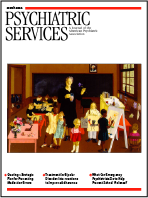Geriatric Psychiatry
Older adults, the most rapidly increasing segment of the U.S. population, increasingly require our professional expertise. Fortunately, the ranks of geriatric subspecialists are growing. However, nonspecialists will also need to stay abreast of advances in the treatment of mental disorders among older adults. It is therefore encouraging to see that geriatric psychiatry has been included as one of the topics of American Psychiatric Publishing's Review of Psychiatry series.
Alan M. Mellow M.D., Ph.D., the editor of Geriatric Psychiatry, is chief of the University of Michigan's division of geriatric psychiatry, an associate professor of psychiatry, director of the Veterans Integrated Service Network 11 Mental Health Service Line, and author of many articles in the field. With the help of a well-selected group of authors from his and other institutions, Dr. Mellow provides a timely and scholarly overview of some hot issues in geriatric psychiatry.
Among the many topics that could be covered in such an abbreviated format, Dr. Mellow has selected a limited number of areas to address with a moderate level of detail. The initial chapter, on late life depression and anxiety, briefly touches on uncomplicated and psychotic late-life depression but focuses in an informative way on two less frequently reviewed topics: the co-occurrence of cognitive and depressive disturbances and the range of anxiety disorders seen among older psychiatric patients. A chapter about dementia provides a selective review of major syndromes and gives the reader a good feel for the presentation and basic management of patients who have Alzheimer's disease, the most common dementing illness. A chapter on late-life psychoses provides a practical guide to assessment and intervention. A chapter on late-life addictions, an often-neglected topic, effectively orients the reader to ways in which older adults differ from younger ones in clinical symptoms and treatment choices.
The final chapter, by Christopher C. Colenda and associates, deserves special mention for its lively and comprehensive presentation of geriatric psychiatry's current key political agendas, including advocacy for financing of geriatric care that is commensurate with the growing needs of this population, enactment of true parity in insurance coverage and other Medicare and Medicaid reforms, more effective integration of psychiatric and medical care, provision of better mental health services in the long-term-care environment, support for innovative treatment delivery programs, and enhancement of the quality and availability of geriatric psychiatry training. This is an ambitious but vital program.
I found this book informative and enjoyable to read but would note that an overview such as provided in this slim volume will not satisfy every reader's needs adequately. Subspecialists who seek more detail will want to consult primary sources or delve into one of the standard textbooks (1,2,3). Generalists wishing to find specific treatment guidelines will want to supplement this book with one of the concise and practical handbooks now available (4,5). The greatest value of Geriatric Psychiatry may be for the general psychiatric reader, primary care clinician, or nonmedical mental health clinician seeking a well-written introduction to an area of increasing importance.
Dr. Ellison is clinical director of the geriatric psychiatry program at McLean Hospital in Belmont, Massachusetts.
1. Sadavoy J, Jarvik LF, Grossberg GT, et al (eds): Comprehensive Textbook of Geriatric Psychiatry, 3rd ed. New York, Norton, 2004Google Scholar
2. Busse EW, Blazer DG (eds): Textbook of Geriatric Psychiatry, 2nd ed. Washington DC, American Psychiatric Press, 1996Google Scholar
3. Coffey CE, Cummings JL (eds): Textbook of Geriatric Neuropsychiatry, 4th ed. Washington, DC, American Psychiatric Press, 2000Google Scholar
4. Jacobson SA, Pies RW, Greenblatt DJ: Handbook of Geriatric Psychopharmacology. Washington DC, American Psychiatric Press, 2002Google Scholar
5. Spar JE, La Rue A (eds): Concise Guide to Geriatric Psychiatry, 3rd ed. Washington DC, American Psychiatric Press, 2002Google Scholar



